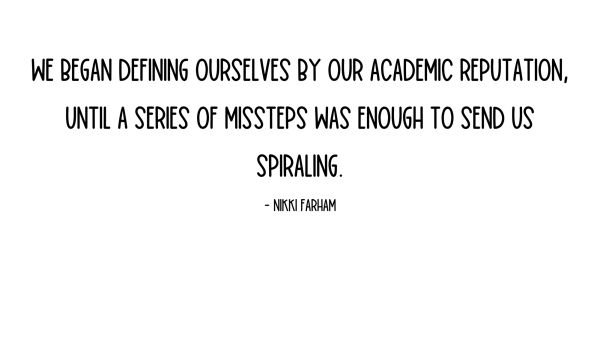It was in the sixth grade that I was pulled into an office and given the CogAT test. CogAT, standing for Cognitive Abilities Test, was an exam that was supposed to decide how adept my brain was at learning, thinking, and reasoning. It measured your ability to extrapolate patterns, imagine objects in your head, solve logic problems, and categorize words together. The test was a means to see students’ general intelligence. But too, it was the master of academic fate that sent countless students down a dangerous road in academia.
Sixth grade was the time that I took the CogAT, and it was also at this moment in sixth grade that I, like many others in the Sioux Falls School District, the state, and the U.S., was eternally damned to the title and expectation of “gifted”.
Every class had to be accelerated, and every test, to be a perfectionist trial that could bear no flaws. It was like this every year, and luckily, effort and success were directly proportional to one another throughout the middle and early high school years. As long as I applied myself, I would always get the “A” in the gradebook I wanted. Though, as I went through my Junior year of high school, the “gifted” road met with a tumbling pitfall.
With the “gifted” expectation that many students place on themselves, I decided to skip an entire year of Spanish to take AP Spanish. But here, I faced adversity that I wasn’t ever used to. I spent hours memorizing what used to take me a class period, I took late nights to complete my homework and projects, and I experienced academic anxiety that I had never known existed in all of my academia.
This all came to a single point when I checked my infinite campus at the end of the semester. The score read, “B”. This was an absolute anomaly in my grades that had never been exhibited before. It may sound delusional and out of touch, but like many students, reading the letter B sent me into a spiral off the “Gifted” road and into a burning, crashing, cataclysm of stress and academic failure. But even more ridiculous than the response to a subpar grade was the fact that it could’ve been fixed by me retaking just one or two quizzes. The perfectionist mindset and burnout from it led to academic failure and furthermore, academic foolishness.
A Georgetown Voice article by Nikki Farham includes, “We began defining ourselves by our academic reputation, until a series of missteps was enough to send us spiraling. I was gifted as a child, but I can’t maintain straight A’s now, so everyone was wrong.” She attributes part of the crash to many “gifted” students never experiencing shortcomings. Effort always meant success. To her it was a “linear relationship that has never let us down. But then it does, and inevitably, burnout.”.
When someone becomes “burnt out” as previously described, their ability, confidence, and efficiency come to a sudden halt. Students stop caring as much about coursework that they once found easy and manageable, their grades start to fall in classes they don’t struggle with content in, and their mental health can take a decline that starts affecting more than just school.

Mrs. Leonard, a teacher at RHS instructing AP Psychology, was asked a few questions given her background in psychology and teaching advanced placement students. To her, she believes the perfectionist mindset doesn’t come from one thing, but multiple. She states, “I would say that it’s parental and societal expectations with high achieving environments and pressure to meet family expectations. She adds that students may even place their identity in their academic performance.
When asked about the effects burnout may have on students, Leonard notes, “Some struggle to accept they’re not perfect and are shocked and in denial … Some disengage from challenges and choose to no longer take risks due to the fear of failure again.” Outside of the school day, she claims, “They have an increase of anxiety, depression, or imposter syndrome. They may not hang out with their friends as much and sacrifice their friendships and hobbies for academics.” The burnout doesn’t only affect their academic performance, but it can start to seep into their social life, their non-curricular life, and their mental health.
It is clear that perfectionism can lead to a catastrophic burnout for many students. But this doesn’t have to be the case. Leonard finishes her interview with the following, “Teach that mistakes are part of growth. We can praise hard work, not just results, encourage self compassion, and help reframe failure as learning.” She adds, “And we can have counseling, mentoring, and peer groups to have as support.” The statements made by the AP Psychology teacher highlights an important lesson. Worth isn’t placed in academic results, nor test scores, nor whether you have an A or a C. Students shouldn’t identify themselves by a class rank or a GPA, but they should rather realize their compassion for learning and growth make them the remarkable students they may aim to be.

High-expectation student burnout is a problem that rattles across every institution, classroom, and school. But the solution to such a social epidemic can exist in every school; parents can teach their children that failure is important, teachers can act as role models to teach effort over achievement, and peers can support their fellow students to achieve academic success with substance rather than falsified merit. As the future of the world, our youth needs to know success exists within themselves rather than on a piece of paper or screen.
We’ve investigated the perfectionist problem that exists in our classrooms, but we also learned of the solution. By accrediting effort and finding importance in failure, students will know success regardless of expectations.
To readers, students, and any person who may feel as though their identity resides in their achievement, their merit, or the list of accomplishments that they have done. I implore you to place it somewhere else. Ask yourself: who are you to your friends, your peers, your family, and to yourself? If the answer is in a single place and not in plurality, then listen to this last piece. Confidently, I tell you that in a places of passion rather than merit, identity finds resilience. Rather than a list of achievements, of responsibilities, or of grades, find identity in every day that you live, in every person that you meet, and in everything that you do.
Sources used:







